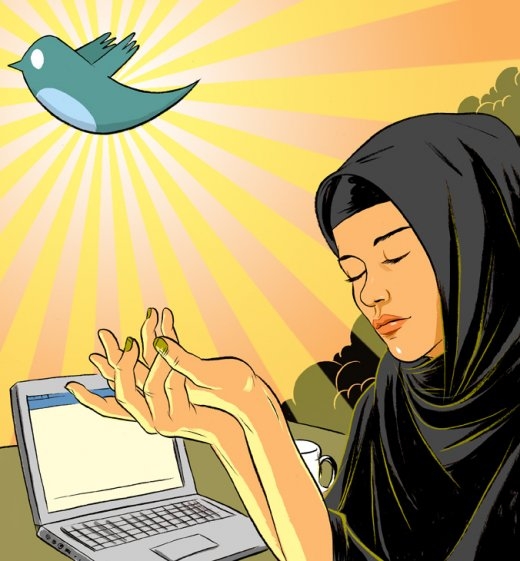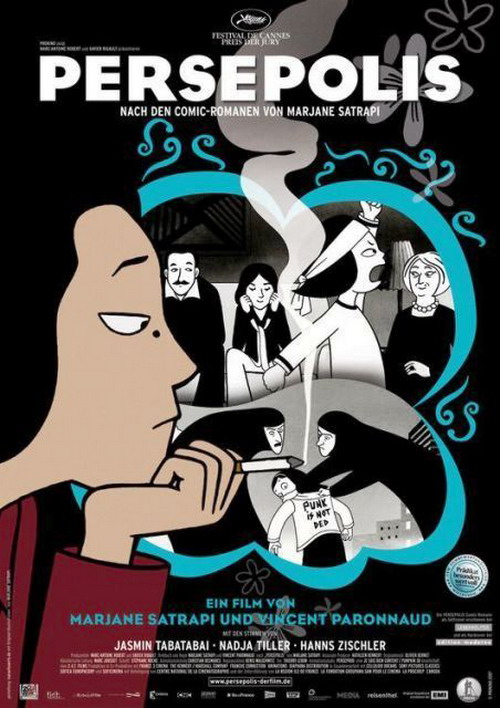
[Illustration by ALEX FINE]
Journalist Maziar Bahari and Dr. Hamid Dabashi, Professor of Iranian Studies at Columbia University, join the National Constitution Center for a conversation on the future of free press and free speech in Iran on Thursday, March 4, 2010 at 6:30pm at the National Constitution Center. Bahari was held in solitary confinement following Iran’s disputed elections in June 2009 for allegedly playing a role in a Western media effort to instigate unrest. He was released in October 2009, and is currently an international correspondent for Newsweek. The program is taking place in conjunction with the One Book, One Philadelphia initiative, which is currently featuring Marjane Satrapi’s The Complete Persepolis, a memoir of a girl growing up in revolutionary Iran. Admission is FREE.
PREVIOUSLY: OUTRAGE: Families Of Dead Forced To Pay ‘Bullet Fee’
PREVIOUSLY: CAN’T HAPPEN HERE: Why Iranians Took To The Streets After A Stolen Election, But Americans Did Not
PREVIOUSLY: GUARDIAN COUNCIL: Votes Counts In 50 Iranian Cites Exceeded The Number Of Registered Voters
PREVIOUSLY: BLOOD BATH: Iran Gov Forces Thwart Mass Rally
PREVIOUSLY: AYATOLLAH: Shut Up, Sit Down!
PREVIOUSLY: ROCK THE VOTE: The New Math
PREVIOUSLY: RISE: Shit Hits The Fan In Iran
PREVIOUSLY: PRESS BLACK OUT: Iran Expels Foreign Media
PREVIOUSLY: EMPIRE STRIKES BACK: 12 Iranians Killed In Mass Demonstrations That Drew More Than One Million
PREVIOUSLY: COUNTER REVOLUTION: 100,000 Flood The Streets Of Tehran To Protest Stolen Election, Demand Change
PREVIOUSLY: IRAN: The Counter Revolution Will Be Digitized
PREVIOUSLY : Can’t Happen Here?
![]() BY JONATHAN VALANIA Iran, 2009. Millions take to the streets to protest what is widely perceived to be a stolen election, despite the prevailing threat of arrest, bodily harm and a body count that currently numbers a dozen protesters shot dead by government forces. And still, day after day, the Iranian people take to the streets to protest the gross violation of their democratic rights. Rewind. The year is 2000. The place is Florida in the immediate aftermath of a presidential election — Bush vs. Gore. The initial tally has Bush ahead by a mere 300 votes, a margin so narrow it triggers a mandatory machine recount. Chaos ensues, lawyers and activists for both sides descend on Florida amid widespread allegations of voting irregularities and voter suppression. Gore asks for a hand recount in four heavily democratic counties. A hand recount, though undoubtedly more accurate, is time-consuming and painstakingly slow, rendered all the more so by confusing
BY JONATHAN VALANIA Iran, 2009. Millions take to the streets to protest what is widely perceived to be a stolen election, despite the prevailing threat of arrest, bodily harm and a body count that currently numbers a dozen protesters shot dead by government forces. And still, day after day, the Iranian people take to the streets to protest the gross violation of their democratic rights. Rewind. The year is 2000. The place is Florida in the immediate aftermath of a presidential election — Bush vs. Gore. The initial tally has Bush ahead by a mere 300 votes, a margin so narrow it triggers a mandatory machine recount. Chaos ensues, lawyers and activists for both sides descend on Florida amid widespread allegations of voting irregularities and voter suppression. Gore asks for a hand recount in four heavily democratic counties. A hand recount, though undoubtedly more accurate, is time-consuming and painstakingly slow, rendered all the more so by confusing  butterfly paper ballots and dangling chads.
butterfly paper ballots and dangling chads.
Florida Secretary of State Katherine Harris, who also serves as co-chair of Bush’s Florida campaign, announced she would reject any revised totals if they were not turned in by November 14. The Florida State Supreme court extends the deadline to November 26th. At this point, the Supreme Court of The United States intercedes and, in a decision that continues to cast a shadow over the high court, declares the Florida court’s extension of the recount deadline is unconstitutional, effectively putting Florida in Bush’s electoral win column and making him the 43rd President of the United States, despite having lost the popular vote. The will of the people is ignored. Oddly, the nationwide reaction to what was effectively a coup d’ tat by judicial fiat is muted. Unlike Iran, there would be no mass demonstrations in the streets of American cities. All of which begs the question: Why?
1. U.S. Election Theft Less Obvious
In Iran, Ahmadinejad won by a landslide, garnering 10 million votes than he did in 2005. In Florida 2000, the margin was razor thin, and the final result  drawn out over six agonizing weeks of procedural bureauracy and legal challenges, lawsuits and counter-lawsuits.
drawn out over six agonizing weeks of procedural bureauracy and legal challenges, lawsuits and counter-lawsuits.
2. U.S. Media Propaganda Machine Far Superior
Iran has a state-run media, which, by definition has a huge disadvantage in convincing the public that it is fair, balanced or even remotely truthful. In the U.S., media is owned by private corporations, giving it the aura of independence even when its reporting what the government wants it to report, as it did in the run up to the Iraq war. In Iran, nobody trusts the state-run media or doubts for one second that it is anything other than a megaphone for the regime. In America, the notion that the mainstream media is a tool of social control is disguised by false debates about which network is more fair and balanced, and which network is the most trusted name in news.
3. US Government Is Better At Keeping Its People Under Control
In Iran, dissenters are arrested and imprisoned. In America, instead of arresting dissenters, we marginalize and discredit them, exiling their opinions to the lunatic fringe of public discourse. In Iran, the public is intimidated by paramilitary goon squads who roam the streets armed with truncheons, cracking open  the skulls of anyone who steps out of line. In America, the public is pacified by television which keeps the populace fat, lazy, ignorant and contented, drunk on meaningless entertainment and distracted by 24-7 celebrity gossip and wall-to-wall sports coverage.
the skulls of anyone who steps out of line. In America, the public is pacified by television which keeps the populace fat, lazy, ignorant and contented, drunk on meaningless entertainment and distracted by 24-7 celebrity gossip and wall-to-wall sports coverage.
4. When You Got Nothing, You Got Nothing To Lose
In America, life is a long, slow get-rich-quick scheme, a breathless marathon sprint on the hamster wheel of material pursuit and wealth accumulation, prodded relentlessly by the near-pornographic allure of the brass ring that will remain forever just out of reach for all but the tiniest minority. To get off the hamster wheel for even one afternoon of marching in the streets is to risk falling hopelessly behind in the race towards ever-elusive upward mobility. In Iran, 53% of the population lives below the poverty line.
5. Plus, All These Reasons…
In America, 50% of the population is over the age of 35, and dug in deep to the status quo, with most steeply leveraged into acquiescence with mortgages, tuition costs and the mortal fear of losing health insurance coverage. In Iran, 70% of the population is under the age of 30. It was only 30 years ago that the Iranian people last overthrew their oppressors. In America, that hasn’t happened in 230 years. In Iran, if you are unhappy with your lot in life and direction of the country, you blame the government; in America, you blame yourself. In Iran they take to the streets, in US they take anti-depressants.
